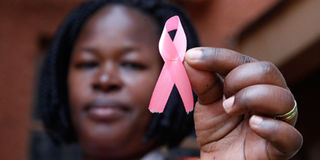Facts and myths about breast, cervical cancer

Photo by Rachel Mabala
What you need to know:
Busting the myths. How much do you know about breast and cervical cancer? Esther Oluka sought views from different health experts who expose the myths and explain the facts about these two types of cancer.
Breast cancer
The facts
Dr Vincent Karuhanga, a healthcare practitioner specialising as a physician at Friends Polyclinic, states:
• Breast cancer is one of the commonest and it affects women above the age of 35 years. It happens when cells in the breast begin to grow uncontrollably. It can affect either one or two breasts.
• 1 per cent of all breast cancers happen to men especially those with big breasts. It is often detected as a hard lump around the nipple area. Unlike the women, most men who are diagnosed with the disease fail to come to terms with the fact that they actually have it. They think it is only a feminine disease.
• It is more common in obese women because the fat cells have aromatase enzyme which is a catalyst in the conversion of testosterone into oestrogen. This at times causes instability in the hormones hence leading to the problem.
• Women who smoke are also likely to get the cancer because the smoke contains substances which make the cells lose track of their orderly growth hence becoming cancerous.
• Alcohol is toxic to the breast cells. Therefore women who drink are more prone to getting it.
• Cosmetic surgeries, mostly breast enlargements, put women at risk, especially when the inserted silicone leaks. This substance easily damages the breast tissue hence to the extent of causing cancer.
Myths
• Going to the pit-latrine naked and one exposes their breasts to the smoke coming from the pit is another myth. There is no any scientific evidence that indicates that the smoke is very harmful.
• People who eat cassava and take a lot of milk do not get cancer is another one of those unproven statements that people say.
Still on the myths, Dr. Fualal Jane Odubo, a senior breast and Endocrine consultant surgeon at Mulago National Referral Hospital, adds:
• Non-fitting or second-hand bras cause this type of cancer. There has never been scientifically proven evidence saying this is true.
• There are also those who say that every lump you find on your breast is cancerous. This is not true as some may turn out to be harmless tumours. But in order to prove this, always ensure that you have it tested.
• Deodorants and sprays cause breast cancer. People just talk. There is no scientific proof of this anywhere.
• Breast pain is a sign that one has cancer. It is not always the case. One may just be feeling uneasiness or discomfort brought about by things such as menstruation.
• Taking birth control pills causes breast cancer. Not all pills do. It depends on how many years one has been taking them and on the type.
Cervical cancer
Facts
Dr. Joseph Nsenga, a gynaecologist at Bethany Women’s hospital in Luzira, says:
• Its cause is known. The cancer is instigated by Human Papillomavirus (HPV) which is mainly spread through sexual contact.
• Virgins do not have or suffer from this form of cancer. It is sexually active women who are more prone to getting it.
• It is preventable with a vaccine administered to girls before becoming sexually active.
• If a majority of women are screened on a regular basis, cervical cancer deaths can be eliminated by more than 90 per cent.
• It has a slow progress and that is why at times it is dubbed a silent killer. It can take someone more than 10 years to know that they are suffering from cervical cancer and most times when the symptoms manifest, it is already too late.
• The commonest symptoms are pain in the pelvis, bleeding during intercourse and having an offensive vaginal discharge.
• What mostly causes women to die from this particular form of cancer is anemia associated with excessive bleeding.
• If someone has cervical cancer and HIV/Aids, their progression of the cancer is quick. This is because HIV/Aids and HPV are cousin viruses which do enhance their actions towards their effect on the body.
Myths
Dr. Nsenga states them as:
• Only prostitutes get cervical cancer because they are highly sexually active. This is not always the case. Even a woman with one sexual partner is prone to getting this kind of cancer.
• If nobody has it in the family, then one cannot get it. Well, it is a wrong assumption. As long as one is sexually active, they are prone to getting this kind of cancer.
• Women who do not notice cervical cancer-related signs and symptoms are healthy. It is not always the case. You can only know after testing.
• Using tampons and sanitary towels causes cervical cancer. If this was the case, many women would be having cervical cancer by now. The cancer is transmitted through sexual contact and not through tampons and pads.




